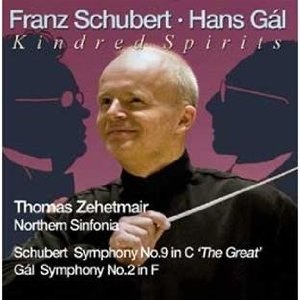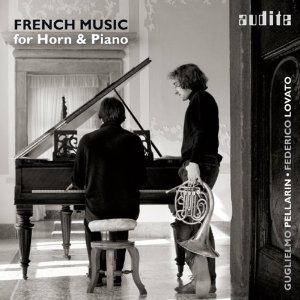Classical CDs Weekly: Gál, Grieg, Liszt, Schubert, Pellarin | reviews, news & interviews
Classical CDs Weekly: Gál, Grieg, Liszt, Schubert, Pellarin
Classical CDs Weekly: Gál, Grieg, Liszt, Schubert, Pellarin
Viennese symphonies, piano warhorses and an Italian plays French music for horn and piano

 Liszt: Piano Concertos 1 and 2; Grieg: Piano Concerto Stephen Hough, Bergen Philharmonic Orchestra/Litton (Hyperion)
Liszt: Piano Concertos 1 and 2; Grieg: Piano Concerto Stephen Hough, Bergen Philharmonic Orchestra/Litton (Hyperion)
Liszt’s two piano concertos, particularly the subtler Second, aren’t played enough. They’re compact, dramatic, witty and cleverly structured, and it’s hard to listen to performances like these without grinning. Liszt can move from high-class schmaltz to cheesy melodrama in a flash; from the most poised romantic reverie to music which sounds as if it’s accompanying someone about to jump off a cliff. And what Stephen Hough excels at is the quick transformation, the mercurial shifts from comedy to heartfelt sincerity. He’s also a fantastic chamber player, and the Second Concerto’s quieter moments are gorgeous here. There’s some particularly lovely playing from the Bergen orchestra’s principal cello as the texture thins out. Hough’s bravura technique sticks in the memory longest though, the astonishing passage work in the final section as the orchestra’s cymbals add offbeat crashes. It’s serious fun. As is the better-known Concerto no 1, remembered fondly for the triangle solos. I always want to love both works more, and hearing the Grieg Concerto which follows makes you realise that Liszt, for all his talents, wasn’t always the most memorable tunesmith.
The Grieg is an appropriate coupling. Liszt sight-read the piece in 1870, approving of Grieg’s flattened seventh in the last movement’s big tune: “G! Not G sharp. Bravo!” There’s nothing groundbreaking here. But the tunes are fabulous. Hough is predictably excellent, though he’s up against stiffer competition in this most over-recorded work. Andrew Litton’s Bergen Philharmonic provide luxuriant support.
Stephen Hough gives a Liszt masterclass
 Schubert: Symphony no 9; Gál: Symphony no 2 Northern Sinfonia/Zehetmair (Avie)
Schubert: Symphony no 9; Gál: Symphony no 2 Northern Sinfonia/Zehetmair (Avie)
Hans Gál, an Austrian of Jewish descent, enjoyed growing success in the interwar years before Hitler’s annexation of Austria led to his fleeing for London in 1938. With the outbreak of war, Gál was interned as an enemy alien, and eventually pitched up in Edinburgh. This is the third disc of Gál’s music issued by Avie, here coupling his weighty Symphony no 2 with Schubert’s vast Ninth. The piece was composed in 1942-43, at a time when Gál’s morale was at its lowest ebb. The scale is impressive – this is an imposing, expansive work. It’s recognisably in the Austro-German tradition, and Gál’s chromatic but defiantly tonal language is affecting. The problem is the musical material; what sounded attractively brittle and quirky in the short Symphony no 1 feels overstretched and ponderous here. It’s all beautifully crafted and highly impressive but ultimately unmemorable. Like a Bruckner symphony with fewer tunes.
Zehetmair’s Northern Sinfonia do play like angels, and they’re heard to much better effect in Schubert’s 9th. It’s very long, full of repeats and most of it is in C major (orchestral musicians refer to it as The Great C Monster). Dull performances are interminable. This is a very good performance, and the minutes fly by. Zehetmair captures the joy, the dizziness in the music, while not shying away from the hints of madness – all that loopy repetition and relentless, caffeine-fuelled energy. And Schubert’s superb brass-writing sounds magnificent here, his use of three trombones adding a sonorous brassy sheen. To sum up, the Gál is worth a listen, especially if you’ve heard the other issues in Avie’s series, but the Schubert is a must-have.
 French Music for Horn & Piano Guglielmo Pellarin (horn), Federico Lovato (piano) (Audite)
French Music for Horn & Piano Guglielmo Pellarin (horn), Federico Lovato (piano) (Audite)
The familiar (to horn players at least) nestles alongside a couple of welcome rarities in this impeccably played horn and piano recital. The horn is a notoriously difficult instrument to record well. The instrument’s bell usually faces the wrong way, and it’s easy to end up with too much boomy resonance. The sound on this Audite release is impeccable. Guglielmo Pellarin is principal horn of the Orchestra dell’Accademia Nazionale di Santa Cecilia, and his expressive, very European sound is captured close-up. Which means here that there’s a lovely, breathy softness to the horn tone, especially when it’s played quietly. Saint-Saëns’s two Romances are unpretentious salon pieces, both exploiting the 19th-century valve horn’s new-found chromatic agility.
Poulenc’s Elégie is one of the most disquieting pieces by this still underrated composer. The 12-note opening theme rapidly cuts into edgy staccato writing, the violence perhaps suggesting the tragic demise of the horn player Dennis Brain, to whose memory it was dedicated. The Sonate by Jean-Michel Damase makes brilliant use of the extremes of the horn’s range; Pellarin’s fruity low register delights here. Jean-Michel Defaye was a pupil of Nadia Boulanger; his ALPHA is occasionally dissonant and unsettling before it lets the horn sing. A superbly executed recital, beautifully accompanied by pianist Federico Lovato.
Explore topics
Share this article
The future of Arts Journalism
You can stop theartsdesk.com closing!
We urgently need financing to survive. Our fundraising drive has thus far raised £49,000 but we need to reach £100,000 or we will be forced to close. Please contribute here: https://gofund.me/c3f6033d
And if you can forward this information to anyone who might assist, we’d be grateful.

Subscribe to theartsdesk.com
Thank you for continuing to read our work on theartsdesk.com. For unlimited access to every article in its entirety, including our archive of more than 15,000 pieces, we're asking for £5 per month or £40 per year. We feel it's a very good deal, and hope you do too.
To take a subscription now simply click here.
And if you're looking for that extra gift for a friend or family member, why not treat them to a theartsdesk.com gift subscription?
more Classical music
 BBC Proms: Faust, Gewandhausorchester Leipzig, Nelsons review - grace, then grandeur
A great fiddler lightens a dense orchestral palette
BBC Proms: Faust, Gewandhausorchester Leipzig, Nelsons review - grace, then grandeur
A great fiddler lightens a dense orchestral palette
 BBC Proms: Jansen, Royal Concertgebouw Orchestra, Mäkelä review - confirming a phenomenon
Second Prom of a great orchestra and chief conductor in waiting never puts a foot wrong
BBC Proms: Jansen, Royal Concertgebouw Orchestra, Mäkelä review - confirming a phenomenon
Second Prom of a great orchestra and chief conductor in waiting never puts a foot wrong
 BBC Proms: Royal Concertgebouw Orchestra, Mäkelä review - defiantly introverted Mahler 5 gives food for thought
Chief Conductor in Waiting has supple, nuanced chemistry with a great orchestra
BBC Proms: Royal Concertgebouw Orchestra, Mäkelä review - defiantly introverted Mahler 5 gives food for thought
Chief Conductor in Waiting has supple, nuanced chemistry with a great orchestra
 Dunedin Consort, Butt / D’Angelo, Muñoz, Edinburgh International Festival 2025 review - tedious Handel, directionless song recital
Ho-hum 'comic' cantata, and a song recital needing more than a beautiful voice
Dunedin Consort, Butt / D’Angelo, Muñoz, Edinburgh International Festival 2025 review - tedious Handel, directionless song recital
Ho-hum 'comic' cantata, and a song recital needing more than a beautiful voice
 Classical CDs: Dungeons, microtones and psychic distress
This year's big anniversary celebrated with a pair of boxes, plus clarinets, pianos and sacred music
Classical CDs: Dungeons, microtones and psychic distress
This year's big anniversary celebrated with a pair of boxes, plus clarinets, pianos and sacred music
 BBC Proms: Liu, Philharmonia, Rouvali review - fine-tuned Tchaikovsky epic
Sounds perfectly finessed in a colourful cornucopia
BBC Proms: Liu, Philharmonia, Rouvali review - fine-tuned Tchaikovsky epic
Sounds perfectly finessed in a colourful cornucopia
 BBC Proms: Suor Angelica, LSO, Pappano review - earthly passion, heavenly grief
A Sister to remember blesses Puccini's convent tragedy
BBC Proms: Suor Angelica, LSO, Pappano review - earthly passion, heavenly grief
A Sister to remember blesses Puccini's convent tragedy
 BBC Proms: A Mass of Life, BBCSO, Elder review - a subtle guide to Delius's Nietzschean masterpiece
Mark Elder held back from blasting the audience with a wall of sound
BBC Proms: A Mass of Life, BBCSO, Elder review - a subtle guide to Delius's Nietzschean masterpiece
Mark Elder held back from blasting the audience with a wall of sound
 BBC Proms: Le Concert Spirituel, Niquet review - super-sized polyphonic rarities
Monumental works don't quite make for monumental sounds in the Royal Albert Hall
BBC Proms: Le Concert Spirituel, Niquet review - super-sized polyphonic rarities
Monumental works don't quite make for monumental sounds in the Royal Albert Hall
 Frang, Romaniw, Liverman, LSO, Pappano, Edinburgh International Festival 2025 review - sunlight, salt spray, Sea Symphony
Full force of the midday sea in the Usher Hall, thanks to the best captain at the helm
Frang, Romaniw, Liverman, LSO, Pappano, Edinburgh International Festival 2025 review - sunlight, salt spray, Sea Symphony
Full force of the midday sea in the Usher Hall, thanks to the best captain at the helm
 Elschenbroich, Grynyuk / Fibonacci Quartet, Edinburgh International Festival 2025 review - mahogany Brahms and explosive Janáček
String partnerships demonstrate brilliant listening as well as first rate playing
Elschenbroich, Grynyuk / Fibonacci Quartet, Edinburgh International Festival 2025 review - mahogany Brahms and explosive Janáček
String partnerships demonstrate brilliant listening as well as first rate playing
 BBC Proms: Akhmetshina, LPO, Gardner review - liquid luxuries
First-class service on an ocean-going programme
BBC Proms: Akhmetshina, LPO, Gardner review - liquid luxuries
First-class service on an ocean-going programme

Add comment